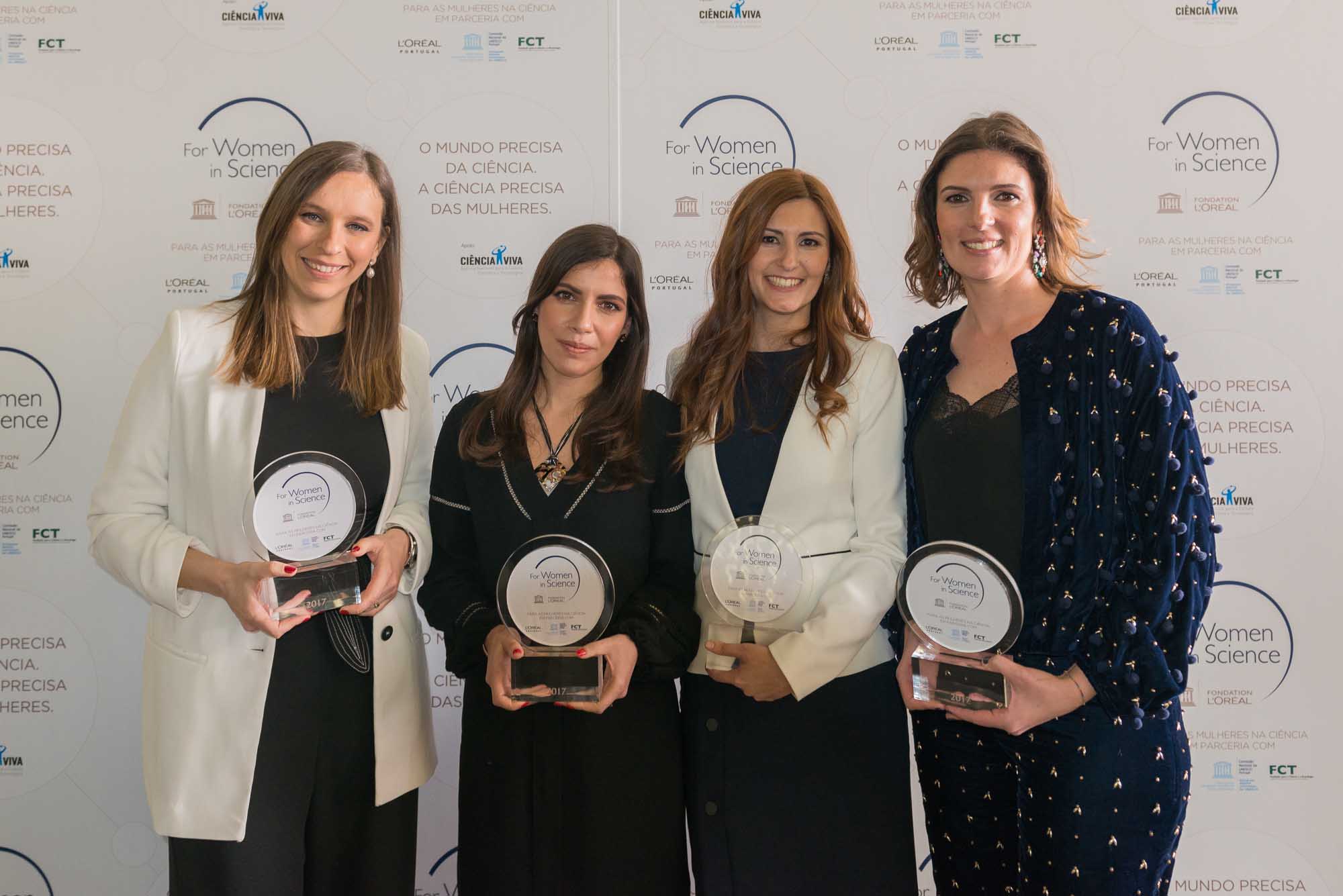14th Edition of the L’Oréal Women in Science Awards

Researchers Carina Crucho, Dulce Oliveira, Inês Bento, and Margarida Fernandes were the winners of the 14th edition of the L'Oréal Portugal Medals of Honor for Women in Science. The Call an initiative of L'Oréal Portugal in partnership with the National Commission for UNESCO and FCT, and is supported by Ciência Viva. The medals were presented at a ceremony held on March 21 at the Pavilion of Knowledge.
This award is given annually, has a value of €15,000, and is aimed at young Portuguese female scientists with a PhD, aged up to 35, who are conducting research in Portugal and carrying out original studies relevant to health and/or the environment. Established in 2004, the award aims to motivate and support young scientists to continue with their projects, having distinguished 45 researchers in Portugal to date. This year, more than 70 young Portuguese scientists submitted their projects to Call, which were evaluated by a scientific jury chaired by Alexandre Quintanilha.
About the award-winning researchers:

Carina Crucho, from Instituto Superior Técnico, is seeking to develop a system for the controlled distribution and release of antibiotics, combining antibiotics with nanotechnology in order to achieve a higher local concentration of antibiotics, thereby enhancing their therapeutic effect and avoiding the need for increasingly higher doses. This study could help overcome the ineffectiveness of conventional antibiotics or even give them a new lease of life, contributing to the development of a new generation of nanoparticles that are more effective in combating resistant bacteria. With a PhD in Organic Chemistry from the Faculty of Science and Technology of the New University of Lisbon, Carina Corucho is currently a postdoctoral researcher funded by FCT at the Instituto Superior Técnico, where she is developing the project "A spoonful of sugar helps the medicine go down: mesoporous silica glyconanoparticles for theranostics."

Dulce Oliveira, from the Portuguese Institute of the Sea and the Atmosphere (IPMA), is conducting a study that, for the first time, analyzes climatic, marine, and terrestrial indicators in marine sediments from the Iberian coast and the east coast of the US. This analysis provides an understanding of the mechanisms naturally associated with extreme weather events (drought, heavy rainfall, fires) and assesses their impact on ecosystems in the Iberian Peninsula and the east coast of the USA. It will also provide essential information for future climate forecasting and modeling, as well as for defining an efficient and economically sustainable environmental policy.
With a PhD in Science and Environment, specializing in Marine Geology and Paleoclimate (2017), Dulce Oliveira has been associated with several institutions, such as: EPHE-PSL University of Paris, Center for Marine Sciences-University of Algarve, Instituto Dom Luiz-University of Lisbon, and EPOC-University of Bordeaux, the institution that awarded her degree. She then received a postdoctoral contract in the field of Paleoclimate, also at the University of Bordeaux. This year, she won a Studentship the field of Marine Geology – Paleoclimate & Marine Palynology, in the ULTImATum project “Understanding past climatic instabilities in the North Atlantic Region”, which is funded by FCT and with which she applied for the L’Oréal awards.

Inês Bento, from the Institute of Molecular Medicine, aims to identify one of the conserved mechanisms of the malaria parasite through her project: the existence of a circadian cycle, which allows this intracellular parasite to control time, anticipate and adapt to cyclical and predictable changes in its environment. Understanding the relevance of this cycle to the survival, virulence, and transmission of Plasmodium and gaining a deeper understanding of the parasite-host interactions at all stages of its development will enable the study of new strategies to combat the disease. This study will also make it possible to identify a universal therapeutic target for all stages of the parasite's life cycle.
In 2008, the researcher began her PhD at the Gulbenkian Institute of Science, developing her research project at the Cell Cycle Regulation Laboratory. In 2012, she defended her doctoral thesis and in 2014 she began her postdoctoral project at the Institute of Molecular Medicine in a new area of research, parasitology.

Margarida Fernandes, from the Physics Center/Biological Engineering Center at the University of Minho, is researching a new generation of active materials for bone tissue engineering. These materials respond to physical stimuli, such as magnetic and mechanical stresses, promoting the cellular growth of osteoblasts (bone cells). The development of these tissue engineering techniques, which include the use of innovative materials to create new bone tissue by stimulating the patient's natural tissue regeneration capacity, will contribute to the treatment of bone injuries and diseases that affect thousands of people worldwide.
He completed his PhD at the Department of Textile Engineering at the University of Minho, in the field of Materials Science/Biotechnology. He completed his first postdoctoral degree in Spain, at the Polytechnic University of Catalonia, in the Department of Chemical Engineering. He is currently conducting research in Portugal, at the Electroactive Smart Materials Group of the Physics Center/Biological Engineering Center at the University of Minho, on the project "Magnetoelectric nanocomposites as platforms for bone tissue regeneration."